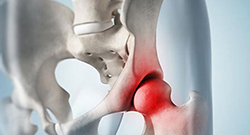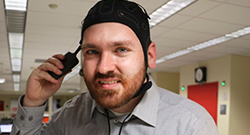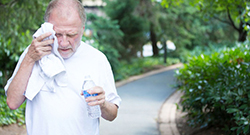 A ray of soccer sunshine on a rainy day
A ray of soccer sunshine on a rainy day
Montreal Impact defender Ambroise Oyongo hands a miniature soccer ball to Jean-Gilles Gadoury, 11, during the team’s annual visit to Montreal Children’s Hospital on Monday. Impact players also tried to brighten a gloomy day with visits to the Shriners Hospital for Children and the Marie Enfant Rehabilitation Centre as part of the MLS club’s Christmas in July initiative. For pictures of this welcome visit, check out the Gazette, TVA Sports and Global.
 MUHC discovery could help treat bone death of the hip
MUHC discovery could help treat bone death of the hip
Scientists at the Research Institute of McGill University Health Centre (RI-MUHC) have discovered a new genetic mutation linked to osteonecrosis of the hip, specifically the femoral head – the spherical-shaped mass at the top of the femur. This breakthrough could allow doctors to identify and treat the disease before symptoms arise and potentially avoid hip replacements. Dr. Chantal Séguin, Hematologist-oncologist at the Bone Engineering and Vascular Biology Research Lab of the RI-MUHC, and senior author on the scientific paper published recently in the Journal of Medical Genetics spoke to The Suburban about the discovery.
 Can zapping your brain be beneficial?
Can zapping your brain be beneficial?
For years, gamers, athletes and even regular people trying to improve their memory have resorted, with electrified enthusiasm, to "brain zapping" to gain an edge. Proponents say these currents are beneficial for a range of neurological conditions like Alzheimer's and Parkinson's diseases, stroke and schizophrenia, but experts are warning that too little is known about the safety of tDCS. Matthew Krause, a neuroscientist at the Montreal Neurological Institute, spoke with CBC about the seemingly futuristic technology, which actually was first studied in Montreal by Dr. Wilder Penfield in the 1920s and 30s.
 Coping with the summer heat
Coping with the summer heat
Summer is finally here. However, with the sun comes the heat and humidity, which can be dangerous to anyone, not just the elderly or people with underlying medical conditions. Even an Olympic athlete needs about 2 to 3 weeks to become acclimatized to high heat and humidity. The MUHC’s Dr. Mitch Shulman explains to The Suburban how to stay safe and have fun during the hot summer months.
[view:related_content=block_2]
